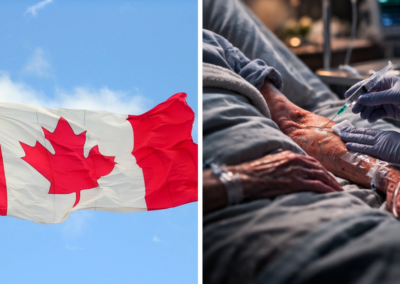Today Right To Life UK has launched a nationwide General Election campaign – the Vote to Do No Harm campaign – that will be run in the lead-up to election day on 4 July.
As part of the Vote to Do No Harm campaign, Right To Life UK is mobilising voters in constituencies throughout the country to contact their local MP candidates and ask them to sign the End of Life Protection Pledge.
Candidates who sign the pledge commit to vote against any attempts to introduce assisted suicide or euthanasia and support the provision of better palliative care for people at the end of their lives.
The assisted suicide lobby has been waging an ongoing campaign to put strong pressure on Parliament to introduce assisted suicide.
No major disability advocate groups in the UK – including Disability Rights UK, Scope and Not Dead Yet – support a change in the law to introduce assisted suicide or euthanasia.
Polling commissioned by SCOPE showed that the majority of people with disabilities (64%) – including nearly three-quarters (72%) of young disabled people – are concerned about moves to legalise assisted suicide. Nearly two-thirds (62%) of people with disabilities who were concerned about a change in the law were worried that pressure would be put on disabled people to end their lives prematurely.
No doctors’ groups in the UK support changing the law to introduce assisted suicide or euthanasia, including the British Medical Association, the Royal College of General Practitioners, the Royal College of Physicians, the British Geriatric Society, and the Association for Palliative Medicine.
Strong opposition from palliative care doctors
In particular, there is strong opposition to introducing assisted suicide from doctors who specialise in working with people with incurable conditions at the end of their life. A survey of palliative care doctors who are members of the Association for Palliative Medicine found that 82% oppose the introduction of assisted suicide. The results of the Association for Palliative Medicine survey have been mirrored in a more recent survey of doctors by the British Medical Association, which found that 83% of palliative care doctors oppose a change in the law to introduce assisted suicide, while only 6% supported such a change.
Palliative care doctors have specialist knowledge and experience of the care that can be provided to people to alleviate suffering at the end of their lives and the results of these surveys show that it is clear to these doctors that specialist care is the solution, not ending their patients’ lives through assisted suicide.
Polling from ComRes found that 51% of the general population, when asked if they “would be concerned that some people would feel pressurised into accepting help to take their own life so as not to be a burden on others if assisted suicide were legal”, said yes. Only 25% disagreed.
Polling of Members of Parliament, conducted by YouGov, showed that only 35% of MPs supported a law change to allow “doctors to assist in the suicide of someone suffering from a terminal illness”.
Palliative care provision gap
There is currently a major gap in the provision of palliative care services in the United Kingdom.
It is estimated that over 100,000 people who could benefit from palliative care die each year without receiving it. According to Hospice UK, the UK hospice sector is facing a collective estimated deficit of £77 million in the financial year 2023-24.
Demand for palliative care is set to increase. In 20 years’ time, there are expected to be 100,000 more people dying each year in the United Kingdom. Analysis by Marie Curie shows that by 2048, the number of people with palliative care needs in the UK will climb by more than 147,000 to over 730,000.
A YouGov poll commissioned by King’s College London shows that 65% of the general population are worried about access to palliative and end-of-life care and 41% think there is too little NHS resource allocated to palliative care.
Constituents are being encouraged to visit www.righttolife.org.uk/donoharm where it takes 30 seconds to ask their local MP candidates to sign the End of Life Protection Pledge.
Spokesperson for Right To Life UK, Catherine Robinson, said “In the next Parliament, we expect the assisted suicide lobby to return with new attempts to introduce assisted suicide. We are urging voters to engage with their local MP candidates and advocate for the protection of the most vulnerable in our society this election. There is currently a major gap in the provision of palliative care services in the United Kingdom. It is estimated that over 100,000 people who need palliative care die each year without receiving it. The UK needs properly funded high-quality palliative care for those at the end of their life, not assisted suicide”.












